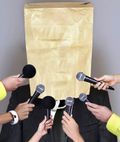 Did the NY Times spark a diplomatic dust-up on the back of naive journalism? Helene Cooper reports that the Obama administration is considering symbolic measures against Israel to register its disapproval of settlement activity.
Did the NY Times spark a diplomatic dust-up on the back of naive journalism? Helene Cooper reports that the Obama administration is considering symbolic measures against Israel to register its disapproval of settlement activity.
Such steps include "stepping back from America’s near-uniform support of Israel" in the UN, and "making use of Mr. Obama’s bully pulpit to criticize the settlements."
That's quite a policy shift, and a real scoop for Cooper. Unfortunately, the story is based on anonymous "administration officials," including one who "spoke on the condition of anonymity because he was not authorized to discuss the issue publicly."
Most likely, this was purposely leaked by Washington insiders precisely to put pressure on Israel and create a storm — while using the Times. Here's why I think that:
- First and foremost, it raises the diplomatic stakes between Israel and the US.
- A policy shift reported in the NY Times won't be overlooked or ignored.
- Anonymous threats remain perfectly deniable.
The problem with unidentified sources is that there's no way for readers to judge for themselves how credible the information is or the motives behind their release. Standard disclaimers saying the source "isn't authorized to discuss the issue publicly" only lend an aura of drama and legitimacy to something akin to sock puppetry.
The Times, for it's part, defends the use of anonymous sources as a necessary evil. (See managing editor Jill Abramson and public editor Clark Hoyt.) The Gray Lady's previous public editor, Daniel Okrent, told LA Weekly's David Ehrenstein:
“I hate unattributed sources and think they’re absolutely necessary to journalism,” says Daniel Okrent, recently appointed public editor at The New York Times. “I know that sounds like a terrible contradiction, but I have no other way of addressing it. They’re used much too much. They undermine the credibility of journalists and publications. On the other hand, if you did not have any unattributed sources, you would have very few whistleblowers. Let’s say there are 100 unattributed sources and 99 of them are spinners or people who are using the press, and the 100th is offering the Pentagon Papers.”
To which Ehrenstein immediately responded:
Okay, let’s. And how many Pentagon Papers have been unearthed since Ellsberg? Exactly. Thankyouverymuch. Moreover, the source of the Pentagon Papers wasn’t unattributed at all. Daniel Ellsberg’s name emerged immediately. And so did Dr. Jeffrey Wigand, the “whistleblower” who blew the lid off the tobacco industry. So what are we to make of those 99 other sources who don’t want attribution because it will blow their cover as paid propagandists? Ask any journalist or editor and your head will spin from the speed at which they change the subject.
The issue of anonymity isn't limited to the NY Times, of course. The Poynter Institute's Kelly McBride offers journalists Questions to Ask Before Going 'Off the Record' with a source. Cooper and the Times were played like a fiddle, and it flies in the face of logic that we're supposed to blindly trust them.

